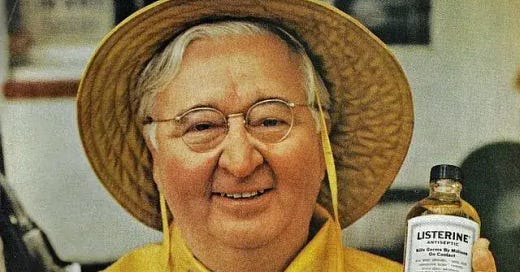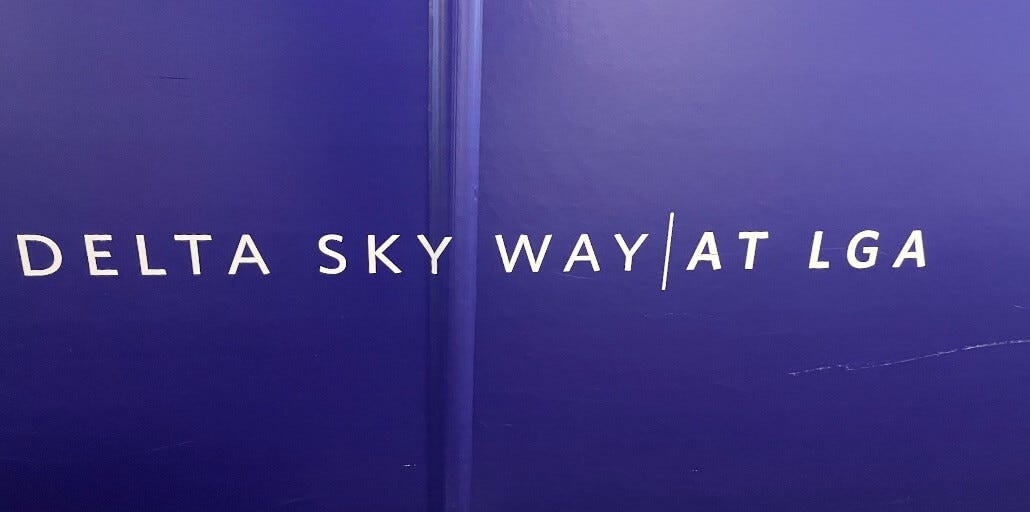The BEST Air Purifiers for 2024 + Other Cheap SEO Ploys
Also if you mouthwash tastes terrible, it's probably for a good reason
Hello Gobbledeers,
How’s it going?
I know I always ask, but if you want to share this newsletter with people you love or hate, it would mean a lot to me. And maybe your friends will then think you have good taste. Or bad taste. I don’t know.
(Groveling finished).
In today’s Gobbledy:
Your company didn’t close because of homeless people.
You’re not the only person with SEO problems.
The worse your product is, the more branding it needs.
Plus, at the end there’s a chart about skiing that has nothing to do with anything.
If You Thought YOUR Company Was Struggling…
We’ve talked before about some of the hilarious(ish) excuses that software founders give for when their business is struggling. Usually it’s that the world wasn’t quite ready for their brilliant idea (like how the world wasn’t ready for the New Jersey mullett I had in 1989).
But also sometimes the world WAS ready for their brilliant idea! The world not being ready for brilliance is only one of the reasons why companies say they go bankrupt.
They could, for example, say that their office was located in an area that became undesirable for some reason, but when they tried to get out of the lease their landlord wouldn’t negotiate, and that impacted (negatively!) their finances and one thing led to another and now they’re bankrupt.
That sounds kinda ridiculous, though. What company would use THAT as their excuse when they could’ve just said that the world wasn’t ready for their ahead-of-its time product, right?
Molekule! That’s the company that would use that excuse! The maker of overpriced-but-also-terrible air purifiers recently declared bankruptcy, and in their petition to the bankruptcy court did not mention the terribleness and overpricedness of their air purifiers, but did mention the situation with their office space:
“San Francisco’s homeless crisis created a dangerous environment around the SF Headquarters, especially in the area between the SF Headquarters and the nearest public transit stop…”
And when their landlord refused to re-negotiate their lease, one thing led to another and now they’re bankrupt.
That’s one way to announce that your company is closing.
But there’s also another way.
Which is why I loved this breath of fresh air from (now-shuttered) Canadian low-cost airline Lynx Air. The world also wasn’t ready for their cheap airfares to sunny destinations. But rather than blame one thing (homeless people living on the sidewalk in the area between their office and public transportation) for their failure, it appears that literally every single thing that possibly could have gone wrong did go wrong. And they listed them in their goodbye note:
Except for inflation, fuel, exchange rates, interest rates, regulatory responsibilities, and competition, Lynx was a great idea.
I appreciate their candor.
(Though, three points off for starting that announcement off with a sentence in the passive voice.)
A Side Note about Search Engine Optimization
If you’re involved in a part of marketing that doesn’t involve SEO, feel free to skip this and go read the thing about Listerine a few paragraphs below.
But if you ARE involved, even tangentially, in SEO, whew have things gotten rough in that part of the world, especially around product reviews.
The very, very, very short version:
Because basically every legacy publisher is dying, one of the desperate moves they’re making is to spin up SEO-friendly product review sites. Because, of course, if you want to read both about Crosby Stills and Nash’s 1974 world tour AND the best COVID-19 Air Purifier, Rolling Stone is your best bet.
If you work for a company where - no matter what you do - Google keeps ranking legacy competitors ahead of you, even if your content is much, much, much better, you’re not alone.
An actual air purifier review site called House Fresh published on their blog a deep (very deep) dive into their SEO struggles as legacy publishers like Rolling Stone have moved into the possibly-fake product review space. If this sounds familiar, it’s very worth reading.
(Also a remarkable coincidence that I’m writing twice about air purifiers in the same column…)
If There’s Something Terrible about Your Product, Brand It
A few times here I’ve mentioned my favorite examples of a companies using the negative attributes of their product as a way to get you to buy the product.
Perhaps you remember the Oatly “This tastes like sh*t, Blah!” advertisement that talked about how some people just don’t like the taste of oat milk and that’s ok because the product isn’t for them. “Some people just don’t like it. They think it tastes like oats, because it does taste like oats.”
So if you have a drawback to your product, I think you have four ways to deal with that as a marketer.
One of your options is talk about that drawback and use it to lure in people who might actually like the product more BECAUSE of that shortcoming. That’s the Oatly approach.
A second option is - well ok, the second option is to keep your head up your own butt and pretend that your product doesn’t have drawbacks even though everyone knows what your product’s drawbacks are and you can pretend that they don’t know that. That’s actually the most frequently used strategy.
A third option is to say that the negative attribute of the product suggests in some way that the product is actually better SPECIFICALLY BECAUSE of that negative thing. For years, mouthwash purveyor (?) Listerine used this strategy because - this will be obvious if you’ve ever used Listerine - Listerine tastes awful:
(If you can’t read that copy, it says: “I hate it but I love it. I figure anything that tastes that bad has got to work. And believe me, Listerine works! It even kills germs that can cause bad breath….”)
That took some guts to run that campaign, no? Back in the 1970s when they ran this, they must’ve really trusted their ad agency. And you can imagine the evolution of this over time where some new VP of Marketing came along and said, “we like the ‘kills germs that can cause bad breath’ but I’m just not comfortable saying that the product tastes bad.” And so they removed the part about how tasting bad is how you know it’s powerful (we think it tastes great!), and then they just left it with a vague claim about germ killing.
That’s the third option. The fourth option you have if your product has a significant drawback: you brand the drawback.
What does that mean?
Well, let’s say you live in New York City (like me!). One experience that many, many New Yorkers have had since Covid is you have a flight that is departing from LaGuardia Airport. Let’s say you have not flown from LaGuardia Airport in quite some time. If this was late 2020 and you arrived at the airport, it’s entirely possible you hadn’t flown in nearly a year. You arrive at LaGuardia Airport and you enter the terminal and ask yourself, “Where the hell did the old airport go?”
Like sometime between the beginning of COVID and whenever you decided to fly again, they managed to entirely re-build LaGuardia. Every New Yorker in 2021 at some point had a conversation with someone where someone said, “Have you been to LaGuardia recently?”
It was like a miracle. Nothing ever gets improved here. But one day there was the worst airport in the United States, and then one day there was a brand new beautiful airport.
(I should mention that some things DO get improved in New York City. The number of rats used to be moderate, then suddenly there were an innumerable number of rats. They really improved the rat population, from the rat’s perspective.)
In any case, they continued to improve the airport and re-build the terminals and sometime in 2022 they re-opened the Delta terminal, but because of my pathetic and unearned loyalty to United, I hadn’t flown Delta from LaGuardia in a bunch of years.
Until last week.
I arrived at the terminal, gawked at how wonderful it was compared to what was there before, and headed to my gate. I walked. And I walked. And I walked some more. And then I walked through corridors that connected the main terminal to the distant, distant gates.
And I thought to myself, “this walk through all of these corridors is the absolute worst part of the experience.”
And that’s when I saw these signs plastered on the walls along the long, dank walls:
These aren’t terrible, long, dank corridors. They’re the “Delta Sky Way at LGA!” I was wrong! You arrive at the very lovely new Terminal C, then you walk through the Delta Sky Way at LGA (tm) to get to your gate. That sounds so pleasant!
If all of your competitors offer one-click integrations with your product, but your software has very few integrations with other tools and requires your engineers to write new code every time to build these connections, those aren’t tedious, time-consuming, manual integrations. They’re “White Glove, Expert Development!”
Branding solves all problems.*
(*Not all.)
(Thanks to Harry Dry’s excellent newsletter Marketing Examples for mentioning Listerine’s marketing strategy a couple days ago.)
A Remarkable Chart about Skiing
If you don’t ski frequently, but you’ve recently thought about going skiing, and you saw the lift ticket prices and said to yourself, “Well, it looks like I’m not going skiing,” this chart (from Chartr) explains why:
Nearly three-quarters of people now buy a subscription pass before the season starts, which lowers lift ticket prices from the nearly $300 walk-up rate at many resorts, to around $100 or less. Turns out subscriptions are a powerful tool.
As always, thanks for reading to the end.
I really, really enjoy chatting with readers, which is why I include a link to sign up for a 25 minute chat: Here’s my Calendly link. We can talk about SEO troubles. Or about a ski trip you took. Whatever.
And lastly, I’ve been doing a bunch of 1-day workshops around messaging, and the outcome is that your homepage will be SO much clearer. If you want your homepage to be clearer, we should chat. You can reply to this newsletter, use that Calendly link, or email me at jared@sagelett.com.








A Listerine marketing spin could have helped: “We keep your smelly air smelly. And anything that smells that bad has got to work.”
Or they could have just stolen Dyson’s (unofficial) tagline: “Haha. You just paid $1,000 for a fan.”
“turned in the worst performance on particulates of any purifier, of any size, of any price, that we have tested in the seven years that we have been producing this guide.”
ouch.